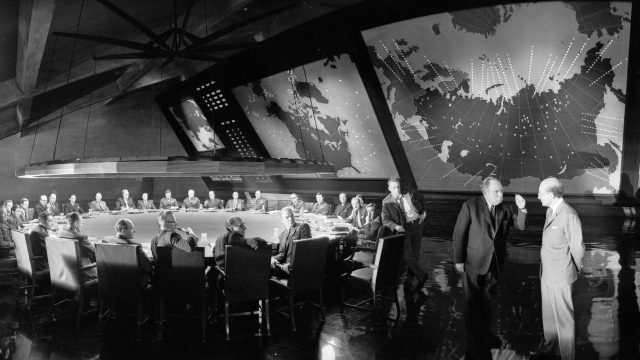
The arrival of director Kathryn Bigelow’s highly anticipated nuclear war thriller “A House of Dynamite” (in theaters and on Netflix now) heralds the return of a long-forgotten genre: the cautionary tale about atomic Armageddon. Filmmakers over the years have explored nuclear war both from the perspective of the decision-makers and the survivors who may wish they had been blast casualties.
‘Fail Safe’ (1964)
When a lone American bomber squadron receives mistaken orders to nuke Moscow, it sets into motion a chilling series of events in director Sidney Lumet’s haunting thriller. As officials try to get Colonel Jack Grady (Edward Binns) to call off the attack, the president (Henry Fonda) weighs conflicting advice from a militant political scientist, Dr. Groeteschele (Walter Matthau), and the more level-headed General Black (Dan O’Herlihy). Eventually the president arrives at an agonizing crossroads. The film depicts a “system built on the very denial of humanity, one in which individual efforts are completely ineffective and bravery is rendered useless,” said Bilge Ebiri at The Criterion Collection. (Tubi)
‘Dr. Strangelove or: How I Learned to Stop Worrying and Love the Bomb’ (1964)
Stanley Kubrick’s ruthless satire of Cold War tensions stands the test of time as an indictment of the madness at the center of nuclear war. Peter Selles plays three roles – President Merkin Muffley, Captain Lionel Mandrake and the hilarious titular character, presidential advisor and ex-Nazi Dr. Strangelove. A rogue commander, Colonel Jack D. Ripper (Sterling Hayden) takes control of an airbase and issues orders to a nuclear bomber wing to attack the Soviet Union.
The iconic image of Major ‘King’ Kong (Slim Pickens) riding a nuclear bomb into oblivion is just one of countless moments that make this one of history’s greatest and most effective dark comedies. A “goonish-ghoulish portrait of diplomatic insanity that’s zippy, ruthless and cartoonish,” Kubrick’s masterpiece argues that “humanity has already passive-aggressively done itself in,” said Eric Henderson at Slant Magazine. (Prime)
‘Testament’ (1983)
Director Lynne Littman’s wrenching drama focuses on one San Francisco-area family after a nuclear blast obliterates life as they know it. Carol Wetherly (Jane Alexander) is tasked with caring for her three children after her husband, Tom (William Devane), is presumed dead in the blast.
There are no action set-pieces in “Testament,” and no breathless scenes at the White House, just a horrifying look at the kind of ordeal that would face ordinary people if their leaders destroyed civilization. It is “steeped in mourning, in the reality of incomprehensible loss, but it is also unforgivingly rigorous in its depiction of life having to move on,” said K. Austin Collins at Vanity Fair. (Prime)
‘Threads’ (1984)
Virtually unknown in the United States, “Threads” is set in the British city of Sheffield, before, during and long after a cataclysmic nuclear war between NATO and the Soviet Union. Jimmy Kemp (Reece Dinsdale) and Ruth Beckett (Karen Meagher) are a young couple expecting a child when tensions between the superpowers erupt over Iran.
When the unthinkable happens, they must fight for survival in ways that bring to life former Soviet Premier Nikita Kruschev’s remark that in a nuclear war, “the survivors will envy the dead.” A film that is “shocking, harrowing and hard to watch,” its realistic style and science-based narration “allows the film to blur the line between drama and documentary” with a “deadpan detachment that is sickeningly unsettling,” said Helen Wood at Den of Geek. (Tubi)
‘By Dawn’s Early Light’ (1990)
Late Cold War Russian hardliners fire a nuclear missile at Donetsk in then-Soviet Ukraine, making it look like a NATO strike in this tense drama. When the Soviets fall for it and launch a significant nuclear counter-strike, the American president (Martin Landau) must choose how to respond to the devastating volley. Powers Boothe and Rebecca De Mornay play a couple flying a B-52 bomber into the Soviet Union as the carnage increases. The director, Jack Sholder, wrestles seriously with concepts like “limited nuclear war” that were hotly debated at the time. A “splendid cast” highlights this “‘Dr. Strangelove’ nightmare revisited, except this isn’t satire,” said Ray Loynd at the Los Angeles Times. (Prime)
‘A House of Dynamite’ reanimates a dormant cinematic genre for our new age of atomic insecurity






